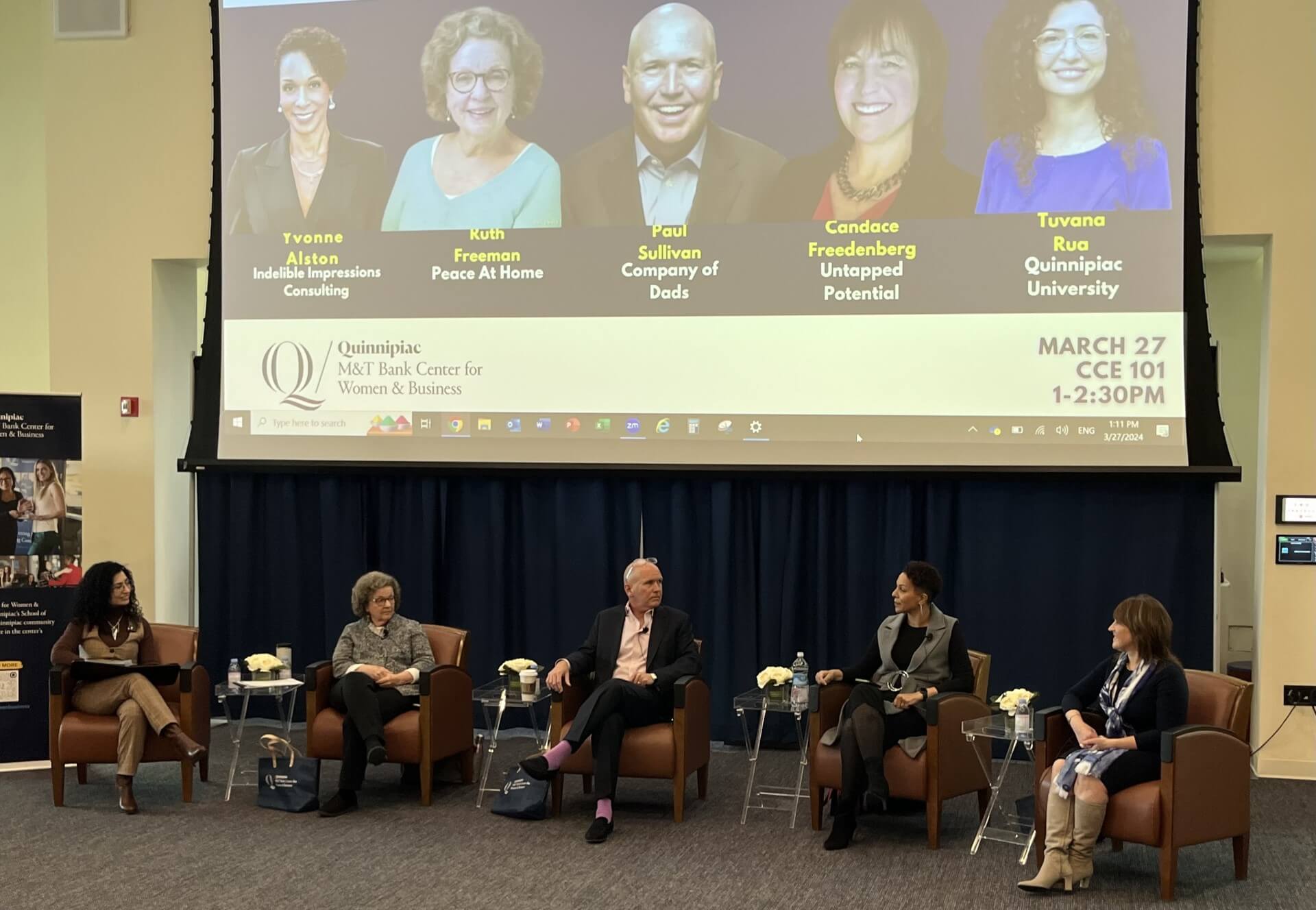
Panel provides key insights to better work-life balance
April 15, 2024

April 15, 2024

Presented by Quinnipiac and the M&T Bank Center for Women & Business on March 27, the panel discussion brought students on the cusp of launching careers together with faculty and staff, representing many stages in the journey of balancing professional demands with life and family.
The panel was moderated by Quinnipiac Associate Professor of Management Tuvana Rua. Rua also serves as co-director of M&T Bank Center for Women & Business with Tamilla Triantoro, associate professor of business analytics and information systems.
Triantoro greeted the audience and Rua thanked the panel for contributing to the afternoon’s important conversation.
“You bring a diverse and rather unique set of perspectives on the balancing act of managing expectations at work and at home,” said Rua.
Panel members included Candace Freedenberg, founder of Untapped Potential Inc., an enterprise focused on advancing businesses by reigniting careers of candidates with work gaps due to caregiving as well as those seeking flexibility to manage family responsibilities; Quinnipiac alumna Yvonne Alston, Chief Culture Architect and founder of Indelible Impressions Consulting, LLC; psychotherapist Ruth Freeman, LSCW, founder and president of Peace at Home Parenting Solutions; and Paul Sullivan, founder of Company of Dads and a former New York Times columnist.
“What we’re going to talk about today day is a preview of coming attractions,” Sullivan said, speaking to the students. “When I was you, my only goal in life was to be a journalist. Not just any journalist, I wanted to write for The New York Times. And the way it worked was I put my head down and worked crazy hours and I was able to do that because I was single.”
By the end of 2021, Sullivan, married, the father of three daughters and left The New York Times to start the Company of Dads, a media company, community platform and workplace educator aimed at lead dads. Lead dads take on the bulk of parenting and household mental load, support their spouse’s career and balance their own work demands.
Noting that the pandemic dramatically shifted norms that had been associated with working life for decades, Rua asked the panel whether any residual changes are altering or impacting expectations between organizations and employees.
Alston said the pandemic workplace paradigm shift underscored the need for life-work balance, rather than work-life balance.
“What employers need to embrace is life-work balance. Our lives come first and our lives are important,” said Alston. “Through the pandemic, there were hardships — financial, mental health, people losing family members and friends. And what I call the ‘collateral beauty’ of the pandemic is that we had the opportunity to sit with ourselves. We had the opportunity to take inventory of life and to identify what matters most as it relates to our work environment.”
The pandemic gave employees more time to be with their family, partner or spouse.
“We were able to build community in really impactful ways and people weren’t really eager to give that up,” said Alston.
It also provided time to reflect on previous in-person work experiences such as dealing with microaggressions, managerial toxicity and time-consuming commutes.
“The concept of psychological safety, which we all should be able to experience in the workplace, unfortunately, was not always reality,” said Alston. “And so there also was a group of people who did not want to go back into that environment again.”
As a result, employees began to speak up and make demands which technically should have always been a part of engagement and dialogue between employer and employee, said Alston.
“What we called it before the pandemic was women were ‘opting out’ — they were choosing caregiving over their career and they were not considered ambitious,” said Freedenberg. “But what we call it now is ‘career-life success.’”
"Career-life success is something in which both the primary parent, female or male, and an employer can engage," said Freedenberg.
“You might have a time when you’re heavily indebted to your family life and then we want to get you to your career potential. So, your career-life success might have a part-time job where you’re staying in the game, keeping up with technology, while you’re caring for kids. And employers understand there is career-life success,” she said.
Freedenberg also had some pivotal advice for women who are coming out of college and planning on career work-life success by being both a 'supermom' and a super-involved employee.
“My advice is don’t wear the cape,” said Freedenberg. “The reason I say don’t wear the cape is because you are perpetuating the problem. You are letting employers go beyond those bounds and demand of you.”
Freedenberg said that’s one reason why Sullivan’s voice on lead dads is so important.
While today’s technology allows many work interactions to take place from home, Freeman counseled ambitious multitaskers to bring reasonable expectations to their goals of working from home or running a business amidst family life.
“Make choices about technology," Freeman said. "You can have your earbuds in your ears and you’re washing the dishes or you’re talking to your kids, but the truth is there’s no such thing as multitasking. You’re actually going back and forth, from thing to thing, in seconds. And that really drains your brain and your well-being. Your success depends on your physical well-being, your emotional well-being and your creativity.”
Freeman recommended setting limits on technology access and tuning into family members.
“Have places where you have no technology – the dining room table, the living room. And ask for feedback from your loved ones about whether you’re present with them. Because you may not notice it, but the important people in your life can tell you."
Quinnipiac Today is your source for what's happening throughout #BobcatNation. Sign up for our weekly email newsletter to be among the first to know about news, events and members of our Bobcat family who are making a positive difference in our world.
Sign Up Now